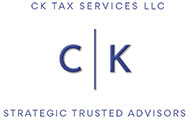Tax Changes You Should be Aware of for Tax Years 2021 & 2022
This is the first of a 4-part blog series on 2021 & 2022 Tax Changes
written by Gina Lee, Senior Associate at CK Tax Services LLC
It is that time of the year to file your individual federal income tax return and there are changes you need to know about. The deadline to file your 2021 federal taxes is April 18, 2022
(not April 15, 2022, due to observation of the Emancipation holiday in the District of Columbia), but the Internal Revenue Service (IRS) encourages people to file early to avoid processing delays. Be mindful of your state’s tax filing deadline, which may be April 15, 2022, and not April 18, 2022. If you file an extension to file your 2021 tax return, the deadline to file is October 17, 2022.
Here are some key items to keep in mind for tax years 2021 and 2022:
• Third Stimulus Payment and Recovery Rebate Credit
IRS started making third stimulus payments in March 2021. The third stimulus payment amount is $1,400 per person ($2,800 for a married couple filing jointly), including each dependent (“Third Stimulus”). You should have received the full amount of the Third Stimulus if your income was less than $75,000 for taxpayers filing single or married filing separately, $150,000 for taxpayers married filing jointly, and $112,500 for the head of household taxpayers.
This time around, the complete phase-out to receive the Third Stimulus occurred at a lower income threshold compared to the previous two stimulus payments. The Third Stimulus phases out at $80,000 for taxpayers filing single or married filing separately, $160,000 for taxpayers married filing jointly, and $120,000 for the head of household taxpayers. If you did not receive the full or partial amount you qualify for based on your 2021 income, the unreceived amount can be claimed on your 2021 tax return as a Recovery Rebate Credit, the same as for the 2020 tax year. The IRS will send Letter 6475 in early 2022, which will indicate the total amount of the Third Stimulus payment you received in 2021.
• Child Tax Credit
For the tax year 2021 only, the Child Tax Credit increased to $3,000 per child under the age of 18, and $3,600 for children age 5 or younger. The increased Child Tax Credit is subject to an income limitation: the credit is reduced by $50 for every $1,000 of income over $150,000 for married filing jointly taxpayers, $112,500 for heads of household, and $75,000 for others. If you do not meet the income limit requirements, you are still able to claim the normal $2,000 Child Tax Credit if your income was $400,000 or less (married filing jointly). The normal $2,000 credit is reduced by $50 per $1,000 of income over $400,000 for married filing jointly taxpayers and $200,000 for all others. Compared to the normal Child Tax Credit, the entire 2021 Child Tax Credit amount will be fully refundable on your 2021 tax return.
For the tax year 2022, the Child Tax Credit is reduced back to its regular amount of $2,000, and the refundable amount is capped at $1,500.
• Advance Child Tax Credit
In July 2021, the IRS started sending to qualified taxpayers early payments of the Child Tax Credit, which was 50% of the estimated amount of the Child Tax Credit that the taxpayer may be eligible to claim on their 2021 federal income tax return. It is called “Advance” Child Tax Credit because, instead of the normal procedure of claiming the refundable amount of the Child Tax Credit for 2021 the following year, 2022, the taxpayer received cash for the estimated Child Tax Credit in the year 2021, not in 2022.
If you qualified and did not elect out of it and your 2019 or 2020 tax return was processed by June/July 2021, you may have received an IRS letter regarding the Advance Child Tax Credit and monthly payments starting mid-July 2021 and continuing through December 2021. On your 2021 tax return, you must reconcile what you received against your actual Child Tax Credit.
The IRS will issue Letter 6419 in early 2022 providing the Advance Child Tax Credit you received in 2021. If you do not receive Letter 6419, you can try to obtain it in the IRS portal. If not, you need to review your bank account deposit history to determine the total amount of the Advance Child Tax Credit received in 2021.
If you were eligible but did not receive the Advance Child Tax Credit in 2021, you did not miss anything. You can claim the full eligible credit amount on your 2021 tax return. Taxpayers who were erroneously issued or were overpaid the Advanced Child Tax Credit may be able to keep some or all of the credits. We will continue to monitor the IRS’s guidance on this.
For 2022, do not expect the Advance Child Tax Credit issued in cash like last year. But, new laws regarding the Advance Child Tax Credit may get passed during the year, in which case we will be sure to update you on this topic in the future.
• Child & Dependent Care Credit

The child and dependent care credit is a tax credit that may help you pay for the care of eligible children and other dependents while you work, look for work, or attend school. The credit is calculated based on your income and a percentage of expenses that you incur for the care of your qualifying dependents. To qualify for this credit, you must have (1) earned income (e.g., wages, salary) or be a full-time student or disabled; (2) one or more qualifying children or dependent; (3) paid someone to provide care for the qualifying person; and (4) had to pay for child or dependent care so that you could work, look for work, or attend school.
For the tax year 2021 only, the qualifying expenses limit increased to $8,000 per qualifying individual ($16,000 for two or more qualifying individuals). The applicable credit rate also increased from 20% to 50%. The credit amount begins to phase out or decrease when the income exceeds $125,000 until $183,000, where the rate will be at 20% until the income reaches $400,000. At this income level, the credit will gradually decrease to $0.
For example, assuming you were a full-time employee and sent one child to childcare for 2021 so that you could work if your 2021 income was $100,000 and the childcare expenses were $10,000:
Qualified expense claimable = $8,000
Applicable Credit rate= 50%
50% of $8,000 = $4,000
You will be able to claim 50% of the $8,000 expenses, equal to $4,000, on your 2021 tax return.
For tax year 2022, the credit will revert to the previous expense limit of $3,000 for one qualifying dependent and $6,000 for two or more individuals. The applicable credit rate will also revert back to 20%.
Charitable Contributions for 2021
Typically, you need to itemize deductions, instead of taking the standard deduction, to receive tax savings from charitable donations. If you itemize deductions, the deduction is capped at 60% of income. Charitable donations beyond this amount can be deducted over the next 5 years.
For the tax year 2021, taxpayers who itemize deductions can deduct up to 100% of their adjusted gross income for charitable donations. This could be beneficial for someone who is retired (or semi-retired) and does not have much-earned income. Donations to donor-advised funds are not eligible for this larger contribution limit. The tax-deductible charitable donation must be made directly to an eligible nonprofit in the U.S.
For the tax year 2021 only, taxpayers who do not itemize deductions may qualify to deduct up to $600 for married couples filing joint returns and $300 for all other filers for any cash contributions made in 2021 to qualifying organizations in the U.S. These tax benefits will not apply after the 2021 tax year unless Congress amends the law, which as of January 28, 2022, has not occurred.
Unemployment Compensation Exclusion
For the tax year 2020, The American Rescue Plan Act provided relief to individuals who received unemployment compensation in 2020, excluding up to $10,200 of their unemployment compensation from their gross income if their modified adjusted gross income (MAGI) was less than $150,000. Unfortunately, the unemployment income exclusion does not apply to the 2021 tax year. If you received unemployment compensation in 2021, none can be excluded and the full amount is subject to federal income tax.
Gina Jeyoung Lee is a senior associate at CK Tax. Gina is involved in individual and business tax planning and compliance, as well as domestic and international estate planning. Gina’s experience includes preparing and reviewing individual and business tax filings, preparing tax planning memoranda, and drafting estate planning documents.
« CK Tax Services LLC – 2021: Year in Review Business Tax Updates for Years 2021-2022 »
